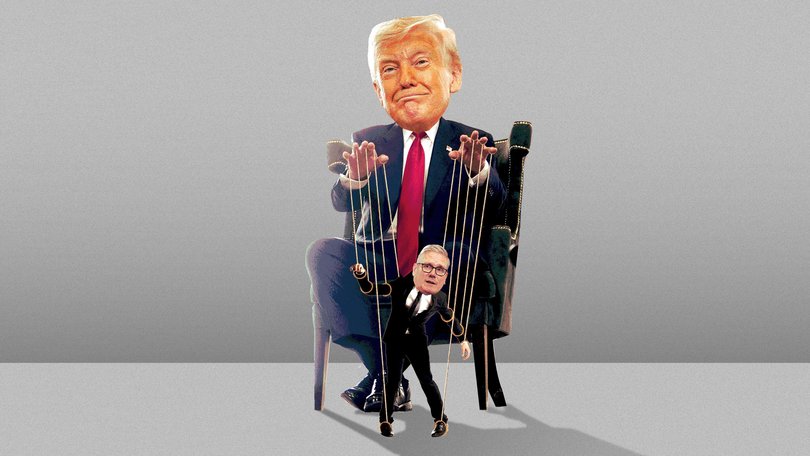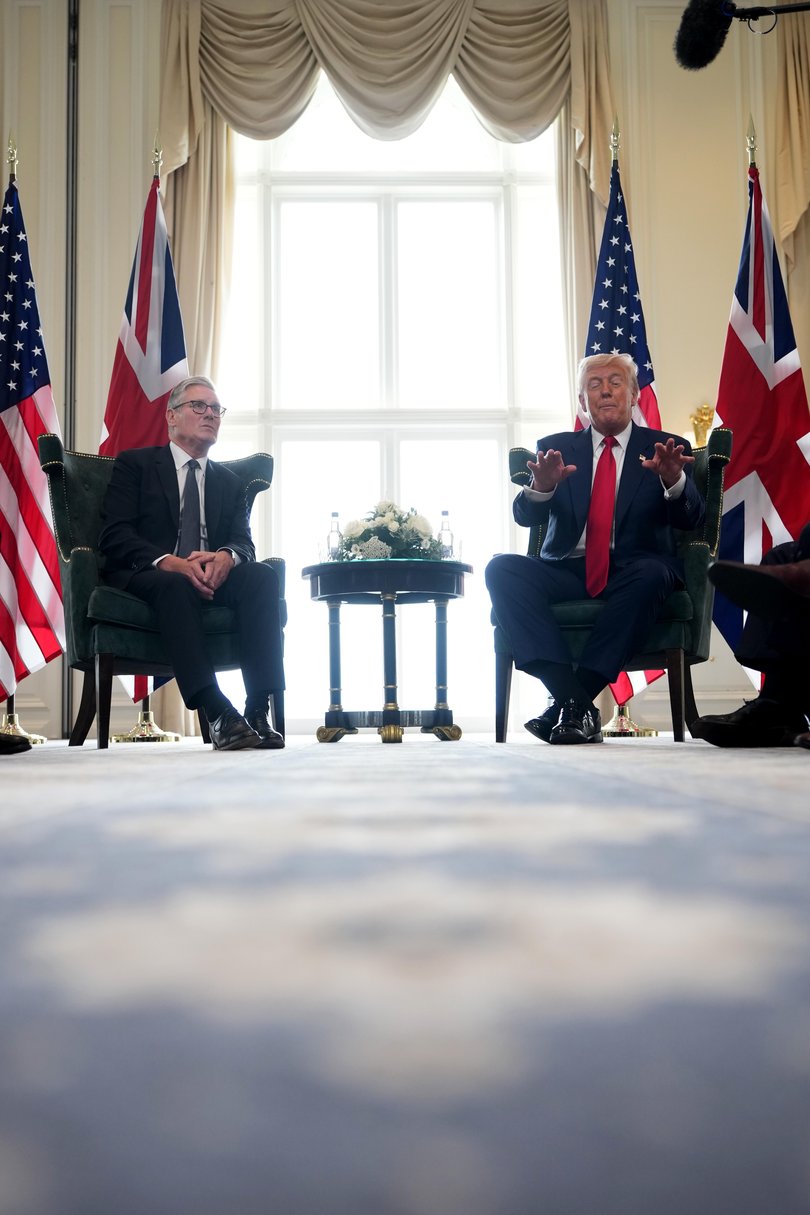Donald Trump trade war: The UK has been no ally on tariffs
JACKSON HEWETT: Working together, economies around the world could have stood up to Trump’s tariffs. Instead the UK raced for the lifeboats, and the rest have folded like dominoes ever since.

Foreign minister Penny Wong and her UK counterpart David Lammy were all smiles this week as they strolled the patio of Kirribilli House.
Behind closed doors, I hope she gave him one of her famous withering stares for the cowardly way the UK caved to the US on tariffs, in the process weakening Australia’s position and global trade in general.
Since Sir Keir Starmer literally bent the knee to snatch a 10 per cent tariff deal - with a side of 25 per cent on steel and aluminium - successive governments have tripped over themselves to secure whatever they can get their hands on.
Sign up to The Nightly's newsletters.
Get the first look at the digital newspaper, curated daily stories and breaking headlines delivered to your inbox.
By continuing you agree to our Terms and Privacy Policy.Sunday it was the EU’s turn to hail a 15 per cent tariff, as opposed to 27.5 per cent as a win - with European Commission president Ursula von der Leyen even having the temerity to suggest it would make European businesses “more competitive”.
Japan has similarly folded in favour of a 15 per cent flat rate.
The US accounts for around a quarter of the world’s GDP, or $US30 trillion ($46trn) of a total $US111trn.
Together, the countries or regions that have struck deals are equal in size to the US.
Working together, they could have stood up to Trump’s tariffs. Instead the UK raced for the lifeboats, and the rest have folded like dominoes ever since.
In what now looks like a textbook case of the prisoner’s dilemma, each country faced the same choice: stand firm against Trump’s tariff ultimatum in the hope of a collective pushback, or go it alone and secure a softer landing. The UK chose to defect early, locking in a 10 per cent rate and securing favourable terms on steel and aluminium.
Once that precedent was set, the incentive for other nations to hold the line collapsed. Japan, the EU, Vietnam and others followed, trading market access and investment pledges for tariff relief.
With each defection, the bargaining power of the remaining holdouts weakened — and Trump’s leverage grew.
So it is with some irony that as Trump held court at his Scottish golf course with Sir Keir, he declared his tariff ambitions had expanded.

“Our position is, if you want to do business in the United States, that’s what you’re going to pay,” Trump said. When pressed for a number, he replied: “I would say in the range of 15 to 20 per cent. Probably one of those two numbers.”
That leaves Australia reliant on catching Trump on a good day if it is to maintain its LIberation Day rate of 10 per cent. The UK could at least bedazzle the gold-loving President with a bit of British pageantry as part of its negotiation. And Sir Keir has clearly used his barrister training to ingratiate himself with the judge.
Anthony Albanese’s charms seem to have so far fallen flat, meaning our great white hope is once again likely to be the Great White Shark.
But back to trade deals, and what it teaches Australia.
The UK is in a parlous economic state. Its debt to GDP is at 100 per cent, the chancellor was brought to tears in Parliament over her economic policies and the country is dangerously close to sliding into recession.
The EU similarly economically straitened. Its debt to GDP is sitting at 84 per cent, growth has effectively flatlined and trade uncertainty has caused the EU to downgrade forecasts.
With little room for manoeuvre the Brits and the EU have decided the best defence is retreat.
“They’ve thrown Trump something to appease their own domestic interests and to give him something to say ‘look, I’m cutting these deals’, so he doesn’t get any crazier than he already is,” said Dr Prudence Gordon, formerly a senior trade policy adviser to three Australian ministers and executive director and founder of the Australian Centre for International Trade and Investment.
Dr Gordon said that any semblance of solidarity quickly crumbled under pressure from sectoral interests.
“All of these countries have domestic constituents that are screaming at them, saying, ‘do something, do something’ instead the option of not doing anything, which is the best option, and the option Australia’s taking.
“We don’t have anywhere near the same impact from US tariffs, so it’s easier for our government to do that but they’ve folded to domestic interests. That’s trade policy 101, and you’ve seen it since, for the last 100-plus years, where the rusty wheels win out over the benefit of everyone else.”
“If they all stood together and said, ‘Trump, knock yourself out. You want to impose those tariffs, go for it, and we won’t retaliate,’ that would have been a powerful message. But domestic political pressure means they just can’t be seen to do that.”
That short term need to shore up domestic industries will come at the expense of long-term competitiveness, with UK and EU firms now trimming their own profitability - and ability to reinvest back in their businesses - in a bid to secure access to US consumers.
“Long term, absolutely, they’re shooting themselves in the foot,” Dr Gordon said. “They’re getting protection on one level, but harming their ability to invest and compete down the track.”
As Australia prepares for its economic reform roundtable, participants should take heed.
Sectoral interests must not outweigh the long term interests of the country, and budget sustainability is critical to be able to absorb the global shocks that will come from the immediate and subsequent consequences of trade instability.
For the optimists, some believe the wheels of global trade are quietly turning outside of Trump’s gaze. Michael Feller, a former DFAT official and founder of the Geopolitical Dispatch, said the framework arrangements being struck by Trump are politically useful optics but lacking in substance.
He points to ongoing EU engagement with partners like Japan and even China, as well as early signals of interest in joining the Comprehensive and Progressive Agreement for Trans-Pacific Partnership (CPTPP), a major multilateral trade pact spanning Asia-Pacific and the Americas.
He also questions whether these so-called deals, which are in fact, ‘frameworks’ are more performative than prescriptive.
“It looks like capitulation, but essentially these deals are pretty meaningless at this stage,” he said. “They lack detail, they’re not ratified, and in many cases they may never be. Trump looks like he’s winning, but we don’t really know.”
Signed or not, the US has not held back on charging tariffs that have fleeced importers to the tune of $US25 billion a month. And perversely, the markets have rewarded Trump for throwing the US’s weight around by sending stocks higher and higher.
It continues the process of sucking capital out of the rest of the world and into the states and, barring a correction, gives Trump more confidence that he can up the baseline tariff.
Dr Gordon said there’s a theory “doing the rounds in Washington” that the optimal tariff rate is somewhere around 15 per cent — a level that supposedly balances domestic manufacturing gains against retaliation risks.
“I think it’s nonsense,” Dr Gordon said, but acknowledged the idea may be helping to shape the new baseline rate.
With the UK no friend in tariff talks, it’s time for Albo to get British Open conqueror Greg Norman on the phone.

